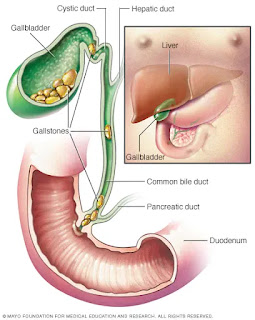What is Gallstone? Gallstone is hardened deposits of digestive fluid that can form in your gallbladder. Gallstones may form if bile contains too much cholesterol, too much bilirubin, or not enough bile salts. Also, Gallstones may form if the gallbladder does not empty completely or often enough.
Cause of Gallstone
They are formed when bile stored in the gallbladder hardens into a stone-like material. Too much cholesterol, bile salts, or bilirubin (bile pigment) can cause gallstones.
Symptoms of Gallstone
Fast, Sudden, and rapidly intensifying pain in the upper right portion of your abdomen, Second, sudden, and rapidly intensifying pain in the center of your abdomen, just below your breastbone, Back pain between your shoulder blades, Pain in your right shoulder, and Nausea or vomiting.
Foods that can cause Gallstone are; meat pies, sausages and fatty cuts of meat, butter, ghee and lard, cream, hard cheeses, cakes and biscuits, and food containing coconut or palm oil.
How can you remove Gallstones without surgery?
It may be possible to take ursodeoxycholic acid tablets to dissolve them if your gallstones are small and don't contain calcium. But these aren't prescribed very often because they're rarely very effective. they need to be taken for a long time (up to 2 years).
Gallstones don't go away on their own. If they start to hurt or cause other symptoms, your doctor may decide to remove your gallbladder. This type of surgery is called a cholecystectomy. It's one of the most common surgeries doctors perform.
How to avoid Gallstone
In order to avoid getting Gallastone you have to do the following, Eat more foods that are high in fiber, such as, Eat fewer refined carbohydrates and less sugar, Eat healthy fats, like fish oil and olive oil, to help your gallbladder contract and empty on a regular basis, and Avoid unhealthy fats, like those often found in desserts and fried foods.
Types of Gallbladder Surgery
- Open surgery.
- Laparoscopic cholecystectomy.
Your surgeon will make a 5- to 7-inch incision (cut) on your belly to take out your gallbladder during this procedure. However, You’ll need open surgery if you have a bleeding disorder. Also, You may also need it if you have severe gallbladder disease, are very overweight, or are in your last trimester of pregnancy.
2-Laparoscopic cholecystectomy
During Laparoscopic cholecystectomy or “keyhole surgery.” Your surgeon doesn’t make a big opening in your belly. They make four small cuts instead. They insert a very thin, flexible tube that contains a light and a tiny video camera into your belly.
These help your surgeon see your gallbladder better. Next, they’ll insert special tools to remove the diseased organ. You’ll be given general anesthesia for both types of surgery.
Gallstones can also lead to more serious problems like
- Cholecystitis -- an inflamed gallbladder.
- Pancreatitis -- an inflamed pancreas.
- Cholangitis -- inflamed bile ducts if left untreated.
The fast Blood test is done. Second, an Ultrasound if performed. Third, an MRI HIDA (hepatobiliary iminodiacetic acid) scan -- a radioactive chemical is put into your body to create images of any blocked ducts. And Endoscopic ultrasonography -- an imaging device is put into your mouth and down through your digestive tract so sound waves can create a detailed picture of your small intestine
Risks associated with Gallbladder Surgery
- Infection.
- Bleeding.
- Bile leakage.
- Injury to the bile duct.
- Injury to the intestine, bowel, and blood vessels.
- Deep vein thrombosis.
- Risks from general anesthetic.
Major treatments for Gallstones
- Laparoscopic cholecystectomy. Almost all surgeons perform cholecystectomies with laparoscopy.
- Open cholecystectomy.
- Endoscopic retrograde cholangiopancreatography (ERCP).
- Oral dissolution therapy.
- Shock wave lithotripsy.
Reasons why women are at risk of developing Gallstones
Estrogen. If Estrogen increases cholesterol, progesterone slows down gallbladder contractions. Both Estrogen and progesterone hormones are especially high during certain periods in your reproductive life, such as menstruation and pregnancy.
When hormone levels begin to drop in menopause, many people use hormone therapy (HT) to replace them, which elevates them again. Excessive body fat can translate to extra cholesterol in your blood. Obesity increases estrogen.
Rapid weight loss has a similar effect to weight gain. However, When you lose a lot of body fat at once, it sends an unusually large load of cholesterol. To your liver for processing, which ends up in your bile.
What is Gallstone
Cause of Gallstone
Symptoms of Gallstone
Foods that can cause Gallstone
How can you remove Gallstones without surgery?
How to avoid Gallstone
Types of Gallbladder Surgery
Major treatments for Gallstones


4 comments:
Love your content girl
Thanks jose
Informative
Very educative
Post a Comment